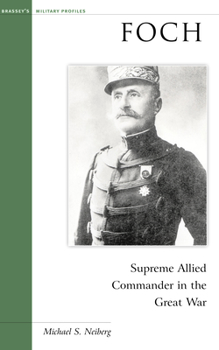Foch: Supreme Allied Commander in the Great War
(Part of the Military Profiles Series)
Select Format
Select Condition 
Book Overview
Ferdinand Foch is the prototype of the twentieth-century general. Better than any other general of the First World War, Foch came to understand how technology and modern alliance systems had changed the nature of warfare. He is most famous for his role as Allied commander in chief in 1918. In this position, unparalleled in the history of warfare, Foch welded together the disparate war efforts of France, Great Britain, the United States, Italy, and Belgium. Now fighting as a more coherent whole, the Allies repulsed the German spring offensives of 1918 and returned to the attack themselves in the summer. In this role, Foch foreshadowed the similar roles played by other commanders of large coalitions, such as Dwight Eisenhower in World War II and Norman Schwarzkopf in Desert Storm. Foch's other important legacy is his public dispute with French prime minister Georges Clemenceau during the armistice and peace negotiations. Foch argued strongly for the creation of Allied bridgeheads across the Rhine River to ensure that a less populous and less industrialized France could defeat a vengeful Germany in the future if necessary. His public quarrels with Clemenceau, who did not share Foch's opinion and did not care for his interference, left the French Third Republic with a civil-military crisis as menacing as the one with which it began World War I. Foch's legacies are both positive and negative, but he left a profound impact on the twentieth century. Michael S. Neiberg masterfully analyzes this complex man and provides a solid overview of French political history against the fabric of the twentieth century's first industrialized war.
Format:Paperback
Language:English
ISBN:157488672X
ISBN13:9781574886726
Release Date:October 2003
Publisher:Potomac Books
Length:124 Pages
Weight:0.25 lbs.
Dimensions:0.4" x 4.8" x 8.2"
Customer Reviews
1 rating
Intriguing look at a dynamic French leader
Published by Thriftbooks.com User , 22 years ago
Marshal Foch is largely forgotten today except by military historians and Francophiles, yet he was among the most important leaders during the Great War. In this illuminating biography, Neiberg restores Foch to his proper place in the annals of military history. Foch wasn't always right--his faith in the offensive proved costly to France in 1914--but the man had elan and cran, verve and guts. As generalissimo of Entente forces in 1918, he was instrumental in defeating Germany's warlords (Hindenburg and Ludendorff) on the Western Front. Neiberg's fast-paced and sympathetic account makes for heady reading. Neither pedantic nor polemical, this book is a "must read" for students of World War I or anyone interested in military matters. In short, I liked it!





